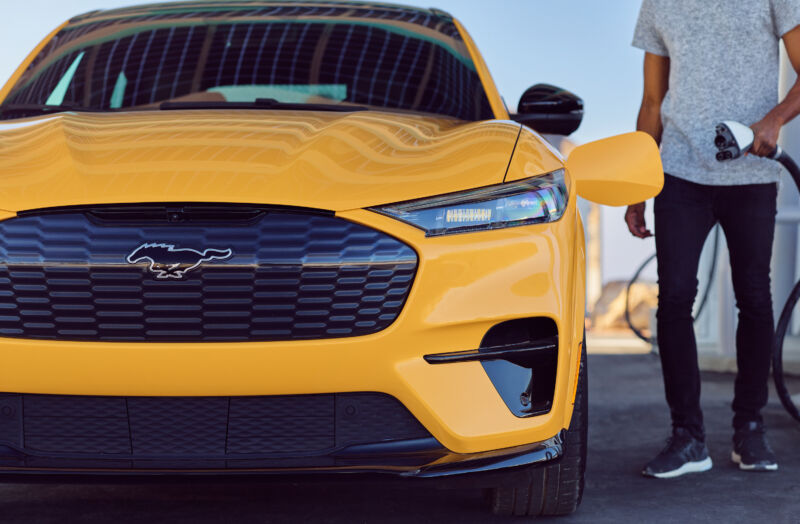
Ford announced today that it will be splitting its electric and fossil fuel vehicle business into two separate divisions. The announcement has investors rallying to the stock but leaves plenty of questions unanswered about the future of the 118-year-old company.
The reorganization caps weeks of speculation that the automaker might split into two separate companies. Ford has said that its future lies in electric vehicles, but for now, the vast majority of its profits come from fossil fuel cars and trucks.
“We are going all in, creating separate but complementary businesses that give us start-up speed and unbridled innovation in Ford Model e together with Ford Blue’s industrial know-how, volume and iconic brands like Bronco, that start-ups can only dream about,” Ford CEO Jim Farley said in a statement.
The new electric division, which will be called Ford Model e, will report directly to Farley. Meanwhile, the fossil fuel division, Ford Blue, will report to Kumar Galhotra, who is currently president of Ford’s Americas & International Markets Group.
The two modes of propulsion aren’t necessarily at odds, but they have different engineering, development, and marketing demands. Investors and analysts tend to believe that EV-only companies can move faster to capture more of the growing EV market than those encumbered with legacy technologies.
Investors and analysts have been pressuring Ford to untether its EV business from its legacy vehicles, but the Ford family is unlikely to completely liberate one business or the other. Still, as capital markets have showered pure-play EV companies with money, Ford clearly wants some of that cash. Tesla, for example, has a market capitalization more than four times Ford, GM, and Stellantis combined despite selling far fewer vehicles.
Whether the move is a best-of-both-worlds approach remains to be seen. The structure could just as easily make Ford the futon of automakers—kind of good at EVs, kind of good at internal combustion, but not excelling at either.
In some ways, the move makes sense. Dedicated EV platforms are sufficiently different from fossil fuel equivalents that they benefit from distinct engineering teams. Without having to accommodate internal combustion engines, the design and development process for a dedicated EV can move faster and allow for more innovation. Meanwhile, the fossil fuel side can operate more like a legacy business with a focus on trimming costs to squeeze the most profit out of products that rely on old technologies that aren’t improving nearly as quickly.
Indeed, “Ford Blue will be an engine of cash and profitability for the whole company,” Galhotra said. In some sense, that’s how Ford has been operating today. While its Mustang Mach-E is reportedly profitable, sales of the electric crossover almost certainly don’t throw off as much cash today as a gas-powered F-150. Keeping the two divisions in the same company will allow the fossil fuel side to subsidize development of new EV platforms and models while also providing funds to build new factories.
Yet the two divisions are expected to produce separate profit and loss statements by 2023, Bank of America said in a note to investors today. Should the EV side be able to generate profits on its own, investors may ramp up pressure within Ford to spin off either business, especially if those statements reveal a declining reliance on fossil fuel margins.
The move could also set up internal struggles between the two divisions as they compete for resources. Based on Galhotra’s comments and Farley’s position as CEO, Ford Model e is clearly the future of the company, and Ford Blue is a cash cow that’s intended to be milked. Even in the laudatory language of press releases, Ford Blue doesn’t sound like it has a very bright or innovative future. One can only image the reception the announcement will receive on the inside. Jobs within Ford Blue, especially design and engineering positions, may be viewed as less prestigious, and the division may suffer from brain drain.
And while investors seem bullish on the news, Ford’s stock isn’t popping like stock for a pure EV company. So while Ford’s access to capital markets may get a little easier, the automaker is not going to jump to Tesla-sized multiples anytime soon.
“They see the stock price of electric-only companies versus the stock price of traditional manufacturers and want in,” one former Ford insider told Ars. “They’ll figure the rest out later.”
https://arstechnica.com/?p=1837760

